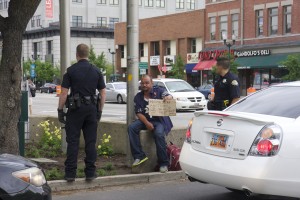PROVO — Looking back at a history of controversy and changing precedents, Provo officials are attempting to strike a fine balance between protecting free speech and securing a sense of order downtown.
Panhandling in downtown Provo has grown problematic over the past year. Residents have become increasingly wary of beggars camped out downtown, questioning city officials as to why they cannot pass more laws discouraging panhandling. But the legal issue at hand is much more complicated than asking for pocket change.
“Panhandling is a form of speech,” said BYU professor Frederick Gedicks, holder of the law school’s Guy Anderson Chair. “They are communicating a desire to receive money as gifts, so they are covered and protected by the First Amendment.”
But Gedicks said there are other ways Provo could appeal to upset residents and business owners that could be considered constitutional, such as passing a law that would prohibit solicitors from blocking pedestrian traffic.
“If solicitors were required to stand up against the buildings and offer their leaflets or hands, so as not to inhibit the flow of pedestrian traffic, I think it could appease both the panhandlers and the business owners,” Gedicks said.

Similar loophole laws that discourage panhandling without banning it have been passed locally. Earlier this year, Provo city council amended the city’s law on aggressive solicitation, stating that solicitors (panhandlers as well as firefighters) had become disruptive to Provo residents and businesses.
According to the modified ordinance, aggressive solicitation would include continued soliciting despite refusals, using profane language to cause fear and intimidation, causing unwanted physical contact with the solicited, or blocking vehicular traffic.
“Basically, they can’t stalk, badger, or enter onto private property,” said Wayne Parker, the city’s chief administrative officer.
Jared Morgan heads up Downtown Provo, Inc., an association of businesses committed to revitalizing the downtown area, and he wants to get rid of downtown panhandling.
“Twenty thousand vehicles pass by on Center Street every day, and these panhandlers are deterring them from stopping,” Morgan said. “It’s started to affect the businesses in the past 12 months.”
According to Morgan, the city is currently looking at new ways to limit panhandler abuse without making the law seem unfair or targeted. One such idea is to create a law prohibiting financial transactions out of a vehicle. Some believe this would help to cut down on panhandling at stop lights.
The legal dilemma of conflicting interests between panhandlers and businesses is not new. In 1990, the U.S. Court of Appeals on the Second Circuit ruled in favor of New York City’s decision to ban begging in subways in “Young v. New York City Transit Authority.” The court determined that the First Amendment did not protect begging as free speech.
“Whether with or without words, the object of begging and panhandling is the transfer of money,” the court ruled. “Speech simply is not inherent to the act; it is not of the essence of the conduct.”

But just four years later, the same federal court ruled in the exact opposite manner in “Loper v. New York City Police Department.” The appellate court ruled New York’s ban on street begging as unconstitutional because, without access to streets to solicit on, beggars were left without an alternative to communicate their wants and needs.
“We see little difference between those who solicit for organized charities and those who solicit for themselves in regard to the message conveyed,” the court’s decision said. “The former are communicating the needs of others while the latter are communicating their personal needs. Both solicit the charity of others. The distinction is not a significant one for First Amendment purposes.”
Charles Mitchell argues in his article “Aggressive Panhandling Legislation and Free Speech Claims: Begging for Trouble,” published in the New York Law School Law Review, that the court wildly flip-flopped on its prior decision.
“In Young, the court was reluctant to characterize begging as anything more than a generic message designed to exact funds, consequently falling far outside the scope of protected speech,” Mitchell said. “In Loper, however, the Second Circuit unambiguously stated that begging involves a form of communication worthy of First Amendment protection.”

That precedent, which largely protects panhandlers in their pleas for money, still stands today. But many cities still pass strict ordinances limiting panhandlers, claiming that otherwise the begging gets out of hand.
Seattle, for example, passed a controversial statute in 1987 prohibiting panhandling that included “conduct which would make a reasonable person fearful or feel compelled.” Seattle further limited panhandling activity by creating other laws that prohibit public urination, public drunkenness and sitting on downtown commercial sidewalks between 7 a.m. and 6 p.m.
The ACLU filed a class-action lawsuit challenging the constitutionality of Seattle’s panhandling laws, but a federal district court ruled the ordinances constitutional in 1994.
[Closing statement needed that ties everything back into the Provo issue]




